Constantine P. Cavafy
Constantine Peter Cavafy (/kəˈvɑːfi/;[2] also known as Konstantinos Petrou Kavafis; Greek: Κωνσταντίνος Π. Καβάφης [ka'vafis]; April 29 (April 17, OS), 1863 – April 29, 1933) was an Egyptiot Greek poet, journalist and civil servant.[3] His consciously individual style earned him a place among the most important figures not only in Greek poetry, but in Western poetry as well.[4]
Constantine P. Cavafy | |
|---|---|
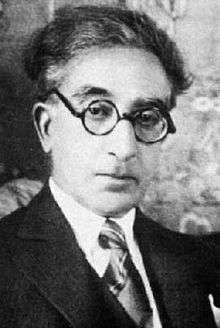 Constantine Cavafy in 1929 | |
| Born | April 29, 1863 Alexandria, Egypt Province, Ottoman Empire |
| Died | April 29, 1933 (aged 70) Alexandria, Kingdom of Egypt |
| Resting place | Greek Orthodox Cemetery, Alexandria, Al Iskandariyah, Egypt[1] |
| Occupation | Poet, journalist, civil servant |
| Nationality | Greek |
| Signature | |
Cavafy wrote 155 poems, while dozens more remained incomplete or in sketch form. During his lifetime, he consistently refused to formally publish his work and preferred to share it through local newspapers and magazines, or even print it out himself and give it away to anyone interested. His most important poems were written after his fortieth birthday, and officially published two years after his death.
Biography
Cavafy was born in 1863 in Alexandria, Egypt, to Greek parents who originated from the Greek community of Constantinople (Istanbul), and was baptized into the Greek Orthodox Church. His father's name was Πέτρος Ἰωάννης, Petros Ioannēs—hence the Petrou patronymic (GEN) in his name—and his mother's Charicleia (Greek: Χαρίκλεια; née Γεωργάκη Φωτιάδη, Georgakē Photiadē). His father was a prosperous importer-exporter who had lived in England in earlier years and acquired British nationality. After his father died in 1870, Cavafy and his family settled for a while in Liverpool. In 1876, his family faced financial problems due to the Long Depression of 1873, so, by 1877, they had to move back to Alexandria.
In 1882, disturbances in Alexandria caused the family to move again, though temporarily, to Constantinople. This was the year when a revolt broke out in Alexandria against the Anglo-French control of Egypt, thus precipitating the 1882 Anglo-Egyptian War. Alexandria was bombarded by a British fleet, and the family apartment at Ramleh was burned.
In 1885, Cavafy returned to Alexandria, where he lived for the rest of his life. His first work was as a journalist; then he took a position with the British-run Egyptian Ministry of Public Works for thirty years. (Egypt was a British protectorate until 1926.) He published his poetry from 1891 to 1904 in the form of broadsheets, and only for his close friends. Any acclaim he was to receive came mainly from within the Greek community of Alexandria. Eventually, in 1903, he was introduced to mainland-Greek literary circles through a favourable review by Gregorios Xenopoulos. He received little recognition because his style differed markedly from the then-mainstream Greek poetry. It was only twenty years later, after the Greek defeat in the Greco-Turkish War (1919–1922), that a new generation of almost nihilist poets (e.g. Karyotakis) found inspiration in Cavafy's work.
A biographical note written by Cavafy reads as follows:
- I am from Constantinople by descent, but I was born in Alexandria—at a house on Seriph Street; I left very young, and spent much of my childhood in England. Subsequently I visited this country as an adult, but for a short period of time. I have also lived in France. During my adolescence I lived over two years in Constantinople. It has been many years since I last visited Greece. My last employment was as a clerk at a government office under the Ministry of Public Works of Egypt. I know English, French, and a little Italian.[5]
He died of cancer of the larynx on April 29, 1933, his 70th birthday. Since his death, Cavafy's reputation has grown. His poetry is taught in school in Greece and Cyprus, and in universities around the world.
E. M. Forster knew him personally and wrote a memoir of him, contained in his book Alexandria. Forster, Arnold J. Toynbee, and T. S. Eliot were among the earliest promoters of Cavafy in the English-speaking world before the Second World War. In 1966, David Hockney made a series of prints to illustrate a selection of Cavafy's poems, including In the dull village.
Work
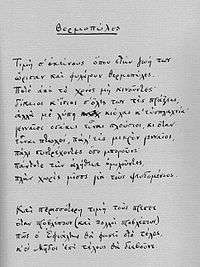
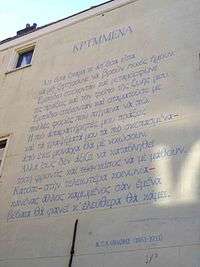
Cavafy was instrumental in the revival and recognition of Greek poetry both at home and abroad. His poems are, typically, concise but intimate evocations of real or literary figures and milieux that have played roles in Greek culture. Uncertainty about the future, sensual pleasures, the moral character and psychology of individuals, homosexuality, and a fatalistic existential nostalgia are some of the defining themes.
Besides his subjects, unconventional for the time, his poems also exhibit a skilled and versatile craftsmanship, which is extremely difficult to translate.[6] Cavafy was a perfectionist, obsessively refining every single line of his poetry. His mature style was a free iambic form, free in the sense that verses rarely rhyme and are usually from 10 to 17 syllables. In his poems, the presence of rhyme usually implies irony.
Cavafy drew his themes from personal experience, along with a deep and wide knowledge of history, especially of the Hellenistic era. Many of his poems are pseudo-historical, or seemingly historical, or accurately but quirkily historical.
One of Cavafy's most important works is his 1904 poem "Waiting for the Barbarians". The poem begins by describing a city-state in decline, whose population and legislators are waiting for the arrival of the barbarians. When night falls, the barbarians have not arrived. The poem ends: "What is to become of us without barbarians? Those people were a solution of a sort."
In 1911, Cavafy wrote "Ithaca", inspired by the Homeric return journey of Odysseus to his home island, as depicted in the Odyssey. The poem's theme is the destination which produces the journey of life: "Keep Ithaka always in your mind. / Arriving there is what you’re destined for". The traveller should set out with hope, and at the end you may find Ithaca has no more riches to give you, but "Ithaca gave you the marvelous journey".
Almost all of Cavafy's work was in Greek; yet, his poetry remained unrecognized and underestimated in Greece, until after the publication of the first anthology in 1935 by Heracles Apostolidis (father of Renos Apostolidis). His unique style and language (which was a mixture of Katharevousa and Demotic Greek) had attracted the criticism of Kostis Palamas, the greatest poet of his era in mainland Greece, and his followers, who were in favour of the simplest form of Demotic Greek.
He is known for his prosaic use of metaphors, his brilliant use of historical imagery, and his aesthetic perfectionism. These attributes, amongst others, have assured him an enduring place in the literary pantheon of the Western World.
Excerpt from Ithaca
| Original Greek (polytonic) | Transliteration | English Translation |
|---|---|---|
|
|
|
Historical poems
Cavafy has written over a dozen historical poems about famous historical figures and regular people. He was mainly inspired by the Hellenistic era with Alexandria at primary focus. Other poems originate from Helleno-romaic antiquity and the Byzantine era. Mythological references are also present. The periods chosen are mostly of decline and decadence (e.g. Trojans); his heroes facing the final end. His historical poems include: "The Glory of the Ptolemies", "In Sparta", "Come, O King of Lacedaemonians", "The First Step", "In the Year 200 B.C.", "If Only They Had Seen to It", "The Displeasure of Seleucid", "Theodotus", "Alexandrian Kings", "In Alexandria, 31 B.C.", "The God Forsakes Antony", "In a Township of Asia Minor", "Caesarion", "The Potentate from Western Libya", "Of the Hebrews (A.D. 50)", "Tomb of Eurion", "Tomb of Lanes", "Myres: Alexandrian A.D. 340", "Perilous Things", "From the School of the Renowned Philosopher", "A Priest of the Serapeum", "Kleitos' Illness", "If Dead Indeed", "In the Month of Athyr", "Tomb of Ignatius", "From Ammones Who Died Aged 29 in 610", "Aemilianus Monae", "Alexandrian, A.D. 628-655", "In Church", "Morning Sea" (a few poems about Alexandria were left unfinished due to his death).[7]
Sensual poems
The sensual poems are filled with the lyricism and emotion of same-sex love; inspired by recollection and remembrance. The past and former actions, sometimes along with the vision for the future underlie the muse of Cavafy in writing these poems.
Philosophical poems
Also called instructive poems, they are divided into poems with consultations to poets, and poems that deal with other situations such as isolation (for example, "The walls"), duty (for example, "Thermopylae"), and human dignity (for example, "The God Abandons Antony").
The poem "Thermopylae" reminds us of the famous battle of Thermopylae where the 300 Spartans and their allies fought against the greater numbers of Persians, although they knew that they would be defeated. There are some principles in our lives that we should live by, and Thermopylae is the ground of duty. We stay there fighting although we know that there is the potential for failure. (At the end the traitor Ephialtes will appear, leading the Persians through the secret trail).[8]
In another poem, "In the Year 200 B.C.", he comments on the historical epigram “Alexander, son of Philip, and the Greeks, except of Lacedaemonians,...”, from the donation of Alexander to Athens after the Battle of the Granicus.[9] Cavafy praises the Hellenistic era and idea, so condemning the closed-mind and localistic ideas about Hellenism. However, in other poems, his stance displays ambiguity between the Classical ideal and the Hellenistic era (which is sometimes described with a tone of decadence).
Another poem is the Epitaph of a Greek trader from Samos who was sold into slavery in India and dies on the shores of the Ganges: regretting the greed for riches which led him to sail so far away and end up "among utter barbarians", expressing his deep longing for his homeland and his wish to die as "In Hades I would be surrounded by Greeks".
Museum
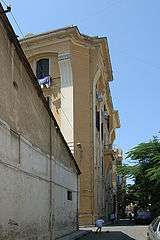
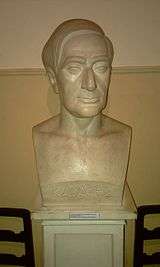
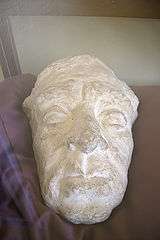
Cavafy's Alexandria apartment has since been converted into a museum. The museum holds several of Cavafy's sketches and original manuscripts as well as containing several pictures and portraits of and by Cavafy.
Bibliography
Selections of Cavafy's poems appeared only in pamphlets, privately printed booklets and broadsheets during his lifetime. The first publication in book form was "Ποιήματα" (Poiēmata, "Poems"), published posthumously in Alexandria, 1935.
Volumes with translations of Cavafy's poetry in English
- Poems by C. P. Cavafy, translated by John Mavrogordato (London: Chatto & Windus, 1978, first edition in 1951)
- The Complete Poems of Cavafy, translated by Rae Dalven, introduction by W. H. Auden (New York: Harcourt, Brace & World, 1961)
- The Greek Poems of C.P. Cavafy As Translated by Memas Kolaitis, two volumes (New York: Aristide D. Caratzas, Publisher, 1989)
- Complete Poems by C P Cavafy, translated by Daniel Mendelsohn, (Harper Press, 2013)
- Passions and Ancient Days - 21 New Poems, Selected and translated by Edmund Keeley and George Savidis (London: The Hogarth Press, 1972)
- Poems by Constantine Cavafy, translated by George Khairallah (Beirut: privately printed, 1979)
- C. P. Cavafy, Collected Poems, translated by Edmund Keeley and Philip Sherrard, edited by George Savidis, Revised edition (Princeton, NJ: Princeton University Press, 1992)
- Selected Poems of C. P. Cavafy, translated by Desmond O'Grady (Dublin: Dedalus, 1998)
- Before Time Could Change Them: The Complete Poems of Constantine P. Cavafy, translated by Theoharis C. Theoharis, foreword by Gore Vidal (New York: Harcourt, 2001)
- Poems by C. P. Cavafy, translated by J.C. Cavafy (Athens: Ikaros, 2003)
- I've Gazed So Much by C. P. Cavafy, translated by George Economou (London: Stop Press, 2003)
- C. P. Cavafy, The Canon, translated by Stratis Haviaras, foreword by Seamus Heaney (Athens: Hermes Publishing, 2004)
- The Collected Poems, translated by Evangelos Sachperoglou, edited by Anthony Hirst and with an introduction by Peter Mackridge (Oxford: Oxford University Press, ISBN 9608762707 2007)
- The Collected Poems of C. P. Cavafy: A New Translation, translated by Aliki Barnstone, Introduction by Gerald Stern (New York: W.W. Norton, 2007)
- C. P. Cavafy, Selected Poems, translated with an introduction by Avi Sharon (Harmondsworth: Penguin, 2008)
- Cavafy: 166 Poems, translated by Alan L Boegehold (Axios Press, ISBN 1604190051 2008)
- C. P. Cavafy, Collected Poems, translated by Daniel Mendelsohn (New York: Alfred A. Knopf, 2009)
- C. P. Cavafy, Poems: The Canon, translated by John Chioles, edited by Dimitrios Yatromanolakis (Cambridge, Massachusetts: Harvard Early Modern and Modern Greek Library, ISBN 9780674053267, 2011)
- "C.P. Cavafy, Selected Poems", translated by David Connolly, Aiora Press, Athens 2013
- Clearing the Ground: C.P. Cavafy, Poetry and Prose, 1902-1911, translations and essay by Martin McKinsey (Chapel Hill: Laertes, 2015)
Translations of Cavafy's poems are also included in
- Lawrence Durrell, Justine (London, UK: Faber & Faber, 1957)
- Modern Greek Poetry, edited by Kimon Friar (New York: Simon and Schuster, 1973)
- Memas Kolaitis, Cavafy as I knew him (Santa Barbara, CA: Kolaitis Dictionaries, 1980)
- James Merrill, Collected Poems (New York: Alfred A. Knopf, 2002)
- Don Paterson, Landing Light (London, UK: Faber & Faber, 2003)
- Derek Mahon, Adaptations (Loughcrew, Ireland: The Gallery Press, 2006)
- A.E. Stallings, Hapax (Evanston, Illinois: Triquarterly Books, 2006)
- Don Paterson, Rain (London, UK: Faber & Faber, 2009)
- John Ash, In the Wake of the Day (Manchester, UK: Carcanet Press, 2010)
- David Harsent, Night (London, UK: Faber & Faber, 2011)
- Selected Prose Works, C.P. Cavafy, edited and translated by Peter Jeffreys (Ann Arbor: University of Michigan Press, 2010)
Other works
- Panagiotis Roilos, C. P. Cavafy: The Economics of Metonymy, Urbana: University of Illinois Press, 2009.
- Panagiotis Roilos (ed.), Imagination and Logos: Essays on C. P. Cavafy, Cambridge, Massachusetts, Harvard University Press, 2010 (ISBN 9780674053397).
- Robert Liddell, Cavafy: A Critical Biography (London: Duckworth, 1974). A widely acclaimed biography of Cavafy. This biography has also been translated in Greek (Ikaros, 1980) and Spanish (Ediciones Paidos Iberica, 2004).
- P. Bien, Constantine Cavafy (1964)
- Edmund Keeley, Cavafy's Alexandria (Princeton, NJ: Princeton University Press, 1995). An extensive analysis of Cavafy's works.
- Michael Haag, Alexandria: City of Memory (New Haven, CT: Yale University Press, 2005). Provides a portrait of the city during the first half of the 20th century and a biographical account of Cavafy and his influence on E.M. Forster and Lawrence Durrell.
- Michael Haag, Vintage Alexandria: Photographs of the City 1860-1960 (New York and Cairo: The American University in Cairo Press, 2008). A photographic record of the cosmopolitan city as it was known to Cavafy. It includes photographs of Cavafy, E M Forster, Lawrence Durrell, and people they knew in Alexandria.
- Martin McKinsey, Hellenism and the Postcolonial Imagination: Yeats, Cavafy, Walcott (Madison, NJ: Fairleigh Dickinson University Press, 2010). First book to approach Cavafy's work from a postcolonial perspective.
Filmography
- Cavafy, a biographical film was directed by Iannis Smaragdis in 1996 with music by Vangelis. A literary form of the script of the film was also published in book form by Smaragdis.
Other references
- C. P. Cavafy appears as a character in the Alexandria Quartet of Lawrence Durrell.
- The Weddings Parties Anything song 'The Afternoon Sun' is based on the Cavafy poem of the same title.
- The American poet Mark Doty's book My Alexandria uses the place and imagery of Cavafy to create a comparable contemporary landscape.
- The Canadian poet and singer-songwriter Leonard Cohen memorably transformed Cavafy's poem "The God Abandons Antony," based on Mark Antony's loss of the city of Alexandria and his empire, into "Alexandra Leaving," a song around lost love.[10]
- Scottish songwriter Donovan featured one of Cavafy's poems in his 1970 film There is an Ocean.
- The Nobel Prize-winning Turkish novelist Orhan Pamuk, in an extended essay published in the "New York Times", writes about how Cavafy's poetry, particularly his poem "The City," has changed the way Pamuk looks at, and thinks about, the city of Istanbul, a city that remains central to Pamuk's own writing.[11]
- Frank H. T. Rhodes' last commencement speech given at Cornell University in 1995 was based on Cavafy's poem, Ithaca.[12]
References
- Egypt, by Dan Richardson, Rough Guides, 2003, pg 594
- Collins English Dictionary – Complete and Unabridged, HarperCollins Publishers, 2003: "Cavafy"
- Before Time Could Change Them. Theoharis Constantine. 2001. pp. 13–15.
- "Constantine P. Cavafy - Greek writer". Retrieved 28 January 2018.
- Woods, Gregory (1999). A History of Gay Literature, the Male Tradition. Yale University Press. ISBN 978-0-300-08088-9.
- "More Cavafy by A. E. Stallings". Poetry Foundation. 27 January 2018. Retrieved 28 January 2018.
- Savvopoulos, Kyriakos (2013). A Historical Guide to Cavafy's Alexandria (331 BCE - 641 CE). Alexandria: Bibliotheca Alexandrina. pp. 105–194. ISBN 978-977-452-243-7.
- "Thermopylae – a poem on the good kind of life". 30 June 2008. Retrieved 28 January 2018.
- "C.P. Cavafy - Poems - The Canon". www.cavafy.com. Retrieved 28 January 2018.
- "Alexandra Leaving". www.leonardcohensite.com. Retrieved 28 January 2018.
- Pamuk, Orhan (19 December 2013). "Other Countries, Other Shores". The New York Times. Retrieved 28 January 2018.
- Rhodes, Frank H. T. "Commencement Address 1995" (PDF). Retrieved August 29, 2016.
External links
| Wikimedia Commons has media related to Constantine P. Cavafy. |
| Wikiquote has quotations related to: Constantine P. Cavafy |
| Greek Wikisource has original text related to this article: |
- C. P. Cavafy - The official website of the Cavafy Archive (in English)
- "The official website of the Cavafy Archive" (in Greek)
- A comprehensive website, including a biography, a gallery, bibliography, news and extensive selections of poetry in English and Greek
- Cavafy in English and Greek, Select Online Resources
- Audio introduction to Cavafy's poems In English, with examination of ten of his finest poems
- The Cavafy Museum in Alexandria
- Cavafy: surviving immortality
- "Artificial Flowers"—translations by Peter J. King & Andrea Christofidou
- Extensive collection of poems, in English & Greek & audio
- Ithaki.net A search engine named in honor of the poem "Ithaki"
- 'As Good as Great Poetry Gets' Daniel Mendelsohn article on Cavafy from The New York Review of Books
- "Of the Jews (A.D. 50)" by C. P. Cavafy
- Audio: Cavafy's poem Ithaka read by Edmund Keeley
- "In the dull village", a painting by David Hockney inspired by Cavafy, now in the British Museum
- Babis Koulouras recites Cavafy's poems by heart. The orchestra of "K.P.Kavafis" team of Culture Club of Ano Syros plays Cavafy's songs (in Greek)
- Works by or about Constantine P. Cavafy at Internet Archive
- Works by Constantine P. Cavafy at LibriVox (public domain audiobooks)
